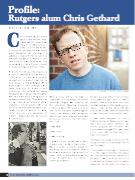Profile: Rutgers alum Chris Gethard By Brian Tobin RC’96, GSN’17 Chris Gethard (RC’02) wants you to find depression funny. It goes against conventional thought to find depression funny, but Chris has made it his career to challenge societal norms about depression and challenge his audience to deal with their sensibilities and emotions about it. Hopefully, this piece about Chris will do the same thing by reviewing his time at Rutgers—one of his most defining, yet difficult, times. Within the first 30 seconds of speaking with Chris—who had a full awareness of 1766 and its generally upbeat perspective—he made it clear that he didn't enjoy his time at Rutgers. While many students come to Rutgers with some feelings of anxiety and intimidation, Chris suffered from severe depression and had suicidal thoughts. Now, he is a movie star leading a cast in the newly released Don't Think Twice, has his own eponymous television show, produced a comedy album, and is the star of a one man show Broadway play, Career Suicide. In most of his work, Chris' characters are extensions of himself—deeply emotional and coping with depression. While possibly difficult for many to understand, his seemingly unorthodox tenure at Rutgers was probably not that uncommon. Mounting pressures, uncertainty about the future, and many other factors often pose students against strong inner demons and depression, while navigating a large and seemingly faceless university for the first time in their lives. It was hard. It was lonely. It was isolating. "I grew up in not the best part of West Orange, and I acted in high school." When it came to picking where he would continue his education, he was faced with a decision that many of us have—he didn't know where he wanted to go. Rutgers was his choice— seemingly by default. ALL PHOTOS COURTESY OF CHRIS GETHARD Rutgers is a large school that continues to expand each year, but in 1998, it seemed unbearable to a self described "oddball who was suffering depression issues. I was a shy, artsy kid who probably would have benefited more from a small liberal arts school at the time." It took almost two years for him to find his footings at Rutgers and it was when he discovered the American studies program and Professor Ann Fabian who encouraged Chris' weirdness. Chris received his bachelor’s in American studies. "Professor Fabian was the only one in the Rutgers infrastructure who was there for me," he recalls. It is probably confronting for the readers of 1766 to read a story that challenges the positive impressions they have of Rutgers. It was certainly difficult to speak about a fellow alumni's negative view of an institution that is so much a 6 1766 MAGAZINE SUMMER 2017
